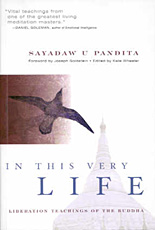Sayadaw U Pandita is the abbot of Panditarama Monastery and Meditation Center in Rangoon, Burma. This rounded and incisive meditation manual is based on talks given at his first three-month retreat at the Insight Meditation Society in Barre, Massachusetts. In the foreword, Joseph Goldstein characterizes these lectures as "a treasure- house of applied Dhamma." They are based on Sayadaw's 40 years of meditation experience.
The author is masterful in his analysis of mind states, and his commentary on the essentials of meditation practice will appeal to a wide variety of readers. He demonstrates how mindfulness can arm the spiritual warrior against the ten forces that attack all yogis: sense pleasure; dissatisfaction; hunger and thirst; craving; sloth and torpor; fear; doubt; conceit and ingratitude; gain, praise, honor, undeserved fame; self-exaltation and disparaging others.
In one of the best chapters, Sayadaw discusses the spiritual practice of equanimity. In a moment of whimsy, he suggests renaming the United Nations the "Organization of Equanimities" so delegates might be constantly reminded of the state of mind essential at the negotiating table. The key to achieving this state is wise attention. The Pali word for equanimity actually refers to the balancing of energy.
The author elucidates: "Equanimity is not insensitivity, indifference, or apathy. It is simply nonpreferential. Under its influence, one does not push aside the things one dislikes nor grasp at things one prefers. The mind rests in an attitude of balance and acceptance of things as they are." Sayadaw spells out five ways to develop equanimity so we won't be constantly swinging back and forth between pleasant and undesirable things. These teachings are very profound and relevant to those of us who live in a consumerist culture where craving and aversion exert a strong and persistent hold over us.
